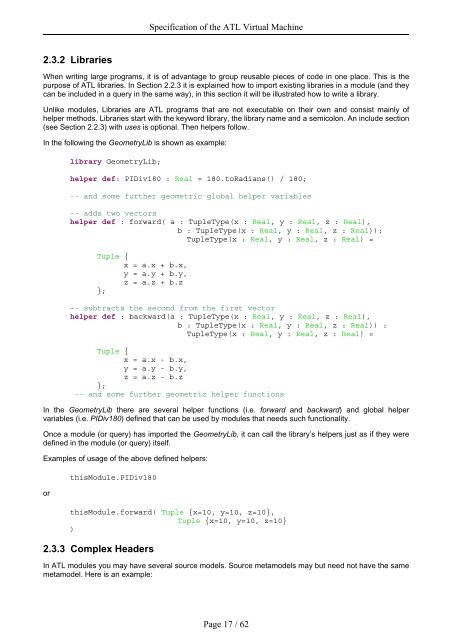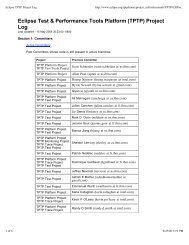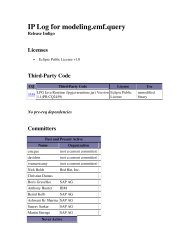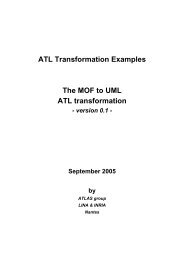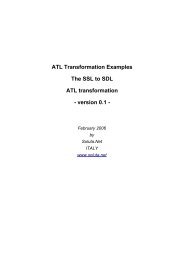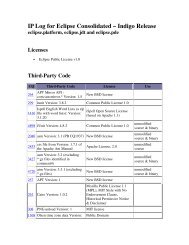ATL: Atlas Transformation Language Specification of the ... - Eclipse
ATL: Atlas Transformation Language Specification of the ... - Eclipse
ATL: Atlas Transformation Language Specification of the ... - Eclipse
You also want an ePaper? Increase the reach of your titles
YUMPU automatically turns print PDFs into web optimized ePapers that Google loves.
2.3.2 Libraries<br />
<strong>Specification</strong> <strong>of</strong> <strong>the</strong> <strong>ATL</strong> Virtual Machine<br />
When writing large programs, it is <strong>of</strong> advantage to group reusable pieces <strong>of</strong> code in one place. This is <strong>the</strong><br />
purpose <strong>of</strong> <strong>ATL</strong> libraries. In Section 2.2.3 it is explained how to import existing libraries in a module (and <strong>the</strong>y<br />
can be included in a query in <strong>the</strong> same way), in this section it will be illustrated how to write a library.<br />
Unlike modules, Libraries are <strong>ATL</strong> programs that are not executable on <strong>the</strong>ir own and consist mainly <strong>of</strong><br />
helper methods. Libraries start with <strong>the</strong> keyword library, <strong>the</strong> library name and a semicolon. An include section<br />
(see Section 2.2.3) with uses is optional. Then helpers follow.<br />
In <strong>the</strong> following <strong>the</strong> GeometryLib is shown as example:<br />
library GeometryLib;<br />
helper def: PIDiv180 : Real = 180.toRadians() / 180;<br />
-- and some fur<strong>the</strong>r geometric global helper variables<br />
-- adds two vectors<br />
helper def : forward( a : TupleType(x : Real, y : Real, z : Real),<br />
b : TupleType(x : Real, y : Real, z : Real)):<br />
TupleType(x : Real, y : Real, z : Real) =<br />
Tuple {<br />
x = a.x + b.x,<br />
y = a.y + b.y,<br />
z = a.z + b.z<br />
};<br />
-- subtracts <strong>the</strong> second from <strong>the</strong> first vector<br />
helper def : backward(a : TupleType(x : Real, y : Real, z : Real),<br />
b : TupleType(x : Real, y : Real, z : Real)) :<br />
TupleType(x : Real, y : Real, z : Real) =<br />
Tuple {<br />
x = a.x - b.x,<br />
y = a.y - b.y,<br />
z = a.z - b.z<br />
};<br />
-- and some fur<strong>the</strong>r geometric helper functions<br />
In <strong>the</strong> GeometryLib <strong>the</strong>re are several helper functions (i.e. forward and backward) and global helper<br />
variables (i.e. PIDiv180) defined that can be used by modules that needs such functionality.<br />
Once a module (or query) has imported <strong>the</strong> GeometryLib, it can call <strong>the</strong> library’s helpers just as if <strong>the</strong>y were<br />
defined in <strong>the</strong> module (or query) itself.<br />
Examples <strong>of</strong> usage <strong>of</strong> <strong>the</strong> above defined helpers:<br />
or<br />
thisModule.PIDiv180<br />
thisModule.forward( Tuple {x=10, y=10, z=10},<br />
Tuple {x=10, y=10, z=10}<br />
)<br />
2.3.3 Complex Headers<br />
In <strong>ATL</strong> modules you may have several source models. Source metamodels may but need not have <strong>the</strong> same<br />
metamodel. Here is an example:<br />
Page 17 / 62


